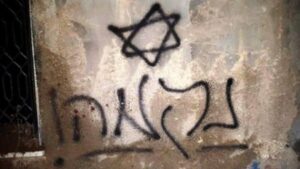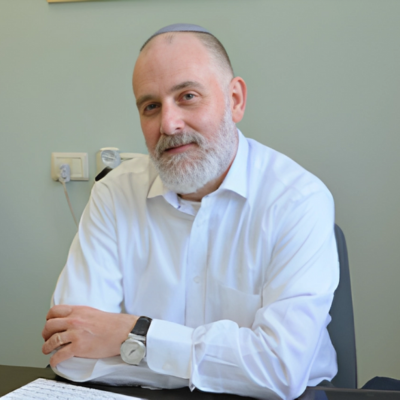Since Hamas’ horrific Oct. 7 attack, some Israelis, like the couple in this video, have been hanging large signs publicly calling for revenge. Nekamah in Hebrew. It’s a loaded word here in Israel and the occupied Palestinian territories. Why? Because nekamah has been a battle cry for vigilante violence against Palestinians for years. Israeli Jewish settlers spray paint the word, often with a Star of David, on Palestinian cars after slashing their tires. On nearby boulders after uprooting Palestinian olive trees. On Palestinian homes and mosques after ransacking and torching them.

Nekamah. It’s a powerful impulse, born of raw pain, deep fear, and inconsolable anger. It goes beyond self-defense. It’s self-perpetuating — the “re” in revenge isn’t there for nothing. Nekama’s intentionally disproportionate terror and violence fuel wars and inflict traumas lasting generations.
But crimes committed out of nekamah are crimes. Immoral acts committed out of nekamah are immoral. Right?
Unfortunately, our tradition is equivocal about this. The Torah is filled with nekamah stories and statutes: The commandment to obliterate all descendants of Amalek, whenever and wherever they may be. (Deuteronomy 25:17-19) The last chapters of the Book of Esther, where Jews kill non-Jews with impunity. The story of Shimon and Levi murdering all the men of Shechem to avenge the rape of their sister, Dinah, in last week’s parshah. (Genesis 34) Repeated calls for an eye for an eye, a tooth for a tooth, a hand for a hand, a foot for a foot. (Exodus 21:24)
Nekamah. I hurt, so you will hurt. I suffered, so you will suffer more.
Find more commentaries on Vayishlach.
The Chanukah “Al Hanisim” prayer that we add to the Amidah each of the eight days covers the holiday’s story with nekamah, too. It poetically describes how God took up the Israelites’ grievance (“ravta et ribam”), judged their claim (“danta et dinam”), and avenged their wrong (“nakamta et nikmatan”), decisively defeating the wicked Greeks.
Luckily, there are counterexamples to nekamah in the Torah that we can choose to learn from and follow instead. The same verse that commands us to love our neighbors as ourselves also forbids us from taking revenge. (Leviticus 19:18) God commands the Israelites to establish cities of refuge to protect manslaughterers from nekamah. (Numbers 35:9-29) Jacob doesn’t bless Shimon and Levi on his deathbed; he curses them for their “lawless” nekamah against Shechem. (Genesis 49:5-7) The Talmud reinterprets “an eye for an eye” as a metaphor for financial restitution. (Bava Kama 83b et seq.)
There’s also the story of Joseph, which we begin reading in this week’s Torah portion, Vayeshev. For all his self-grandeur and physical beauty, Joseph is used and abused by the people around him. Joseph’s brothers sell him into slavery. (Genesis 37:18-28) Potifar’s wife falsely accuses Joseph of rape, leading Potifar to wrongfully imprison him. (39:7-20) Pharaoh’s pardoned cupbearer forgets to petition for Joseph’s release from jail. (40:9-15, 23)
Joseph could justify taking nekamah against any or all of them. But he doesn’t. Instead, he keeps on keeping on. Joseph continues interpreting dreams. (41:25-36) Faithful to Pharaoh, he implements plans that save Egypt and its neighbors from extreme famine. (41:47-57) When Joseph reveals himself to his brothers, he quickly allays their fears of nekamah: “Now, do not be distressed or reproach yourselves because you sold me [into slavery]; it was to save life that God sent me ahead of you.” (45:5) Joseph invites the entire family to come live with him in Egypt, under his protection, providing for all of their needs. (45:10-11)
For his refusal to let violence make him violent, his refusal to let injustice make him unjust, and for showing that not all “hurt people hurt people,” I claim Joseph as a role model.
Find more commentaries on Israel/Palestine.
Tamar, a 19-year-old member of Kibbutz Be’eri, where more than 100 Israelis were massacred by Hamas on Oct. 7, is also a role model. She is not the Viceroy of Egypt with the power Joseph had to order or withhold nekamah. But Tamar uses the power she does have, as a survivor, to reject nekamah. Listen for yourself. After recalling the horrors she personally experienced and witnessed, she calls all calls for nekamah shameful: “Bushah! Bushah!” (2:40) Tamar pleads instead for peace. Her voice is brave and powerful, raw and emotional, moral and decidedly Jewish.
Tamar’s voice is only one among many. Other survivors and relatives of those killed or kidnapped reject the idea that more force and more violence is the answer.
This Chanukah, let’s choose to follow the examples of Joseph and Tamar, and say no to nekamah. When the time comes to say the “Al Hanissim” prayer, let’s skip the vengeful words “nakamta et nikmatam.” I’ll bet dollars on jelly donuts that you won’t miss them. When someone demands nekamah against Palestinians, let’s acknowledge and validate their loss, hurt, pain, suffering, fear, and anger. But then let’s also acknowledge that nekamah begets only more nekamah. It is not, and never will be, a substitute for the real work, the hard work, the really hard work, we all must do in pursuit of equality, freedom, social justice, dignity, self-determination, and peace.
Rabbi Ian Chesir-Teran is T’ruah’s Rabbinic Educator in Israel. He is a member of Kibbutz Hannaton, located in Israel’s Lower Galilee.

